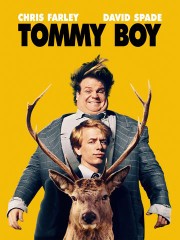Holy Schnikes! Tommy Boy is Still Hilarious 25 Years Later
We look back at the late, great Chris Farley's first — and best — starring role and why it still makes us laugh to this day.
Near the end of Adam Sandler’s 100% Fresh — we see what you did there — he plays a musical tribute to Chris Farley. The Springsteen-esque song features gentle guitar strums and heartfelt thoughts on Sandler’s former SNL castmate, and as he sings, classic clips from the late, great comedian play in the background. It’s emotional, especially because it comes from a guy whose comedy is often synonymous with silly, sophomoric humor, and after it’s over, Sandler tells the audience, “He was by far the funniest f—ing guy of all time.” Farley was that funny — anyone who’s seen him as the hyper stress-fest that is motivational speaker Matt Foley or as the bumbling host of “The Chris Farley Show” would have a hard time dismissing that outright. He could be insanely loud and in-your-face one moment, a sort of one-man comedy tornado, and weirdly sweet and empathetic the next. He lit up whatever he was in.
But could what made Farley such a tour de force on SNL translate onto the big screen, especially in a starring role and especially amid all those big-budget movie trappings: sweeping crane shots, a ceaseless score, and by-the-numbers plotting? That was the question Tommy Boy — released 25 years ago on March 31, 1995 — would answer. The first in Farley’s Movie Star canon is a road comedy, chronicling spoiled man-child Tommy (Farley) and his uptight dry-wit of a minder, Richard (David Spade), as they try to save Tommy’s family business. At the time, critical reception was lukewarm-to-cold (it sits at 42% on the Tomatometer), with Variety scoffing that “stupid is apparently in” and The Independent branding it “a comedy that might be a hoot after several beers but is otherwise best avoided.” Yet the same qualities those reviews slung as insults were exactly what moviegoers of a certain age were looking for in a film: decidedly dumb, preferably watched late at night with friends, and packed with lots of quotable lines. Here’s why Tommy Boy still holds up after all these years.
IT PROVED CHRIS FARLEY COULD CARRY HIS OWN MOVIE
As implied above, Farley may have owned his skits more than anyone else to grace the stage at SNL. He also proved — both before and after Tommy Boy — incredible in small parts on the big screen, most notably as the sad-sack bus driver in Billy Madison and the barfly with a bitten-off nose in Dirty Work. In the lead of a feature, though, you could understand the skepticism: Would the joke run thin? Would this character make any sense for an entire 90 minutes? Somehow, all of his larger-than-lifeness works in Tommy Boy. It’s his best starring role (Black Sheep, Beverly Hills Ninja, and Almost Heroes aren’t exactly stiff competition, but still), one that leaves you watching to see what Tommy will stumble into next as opposed to waiting out a series of high-energy pratfalls.
FARLEY AND DAVID SPADE HAVE UNDENIABLE COMIC CHEMISTRY

(Photo by ©Paramount Pictures courtesy Everett Collection)
Another reason Farley works so well as a lead here? Spade, the cynical ying to Farley’s trusting, airheaded yang. The pair fits nicely in a long line of comedy duos, both classic (Laurel and Hardy stand out, not only because of the disparity in body sizes) and more modern (Jake and Elwood in The Blues Brothers, John Candy and Steve Martin in Planes, Trains & Automobiles). Tommy Boy lifts from that latter movie’s playbook, actually: There’s the never-ending road trip with polar opposites and the destruction of their car (complete with a double take when it’s demolished). There seemed to be more than a bit of life-imitating-art going on as well. (Or was it viceversa?) As one of the film’s writers put it in a making-of doc, the two were a sort of IRL Odd Couple, with Spade often throwing sarcastic jabs at Farley, promoting immediate bursts of laughter, when the cameras weren’t rolling.
IT’S ENDLESSLY QUOTABLE
Many of the moments that land in Tommy Boy come from that same off-the-cuff, we’d-be-joking-with-each-
“Hey, does this suit make me look fat?”
“No, no, no. Your face does.”
Perhaps the movie’s most memorable scene, too, came from someone on set noticing that, after shooting the “fat guy in a little coat” bit, Farley started singing the dialogue. They thought it was so funny they decided to reshoot it, and it’s hard to imagine it working nearly as well without Farley’s sing-songy delivery. There are too many good quotes from Farley to list here — besides, many of them have been recited ad nauseum in college dorm rooms over the last two-plus decades — but let’s spotlight these doozies: “Brothers don’t shake hands. Brothers gotta hug,” and “John Hancock… It’s Herbie Hancock.”
DAN AYKROYD CRANKS IT UP TO 11

(Photo by ©Paramount Pictures)
A few of the minor characters fall flat in this movie — as Tommy’s new stepmom, Bo Derek was even nominated for a Razzie Award for Worst Supporting Actress — but one in particular is memorable above all the others. As auto magnate Ray Zalinsky, Dan Aykroyd leans on his stereotype-on-steroids Chicago accent as he says lines like,““I make car parts for the American working man, because that’s what I am, and that’s who I care about.” Ostensibly one of the villains of the film, Zalinsky is part Bass-O-Matic motor-mouthed salesman, with every spat-out pronouncement delivered with such a punch that it makes his turn as Elwood in The Blues Brothers look subtle in comparison. It’s ridiculous — and a joy to watch.
FARLEY’S SWEETNESS IS ON DISPLAY

(Photo by ©Paramount Pictures courtesy Everett Collection)
If Tommy was just an imbecile running into things — and, to be fair, that might be his defining characteristic — it wouldn’t give one much reason to watch this movie, let alone return to it. But there’s a lot of love in Farley’s take on a spoiled know-nothing. He wants everybody to like each other and get along, and even the few moments that touch on loss oddly ring true in Farley’s hands. It’s the same trick he pulled off so brilliantly on SNL’s “The Chris Farley Show,” the ability to end a flubbed interview with Paul McCartney with an “aww”-inducing moment of connection. We may never know what other moments like that he had in him, but at least we have films like Tommy Boy to remind us what he was capable of.
Where You Can Watch It Now
Amazon (rent/own), FandangoNOW (rent/own), Google (rent/own), iTunes (rent/own), Vudu (rent/own)
Tommy Boy was released on March 31, 1995.







